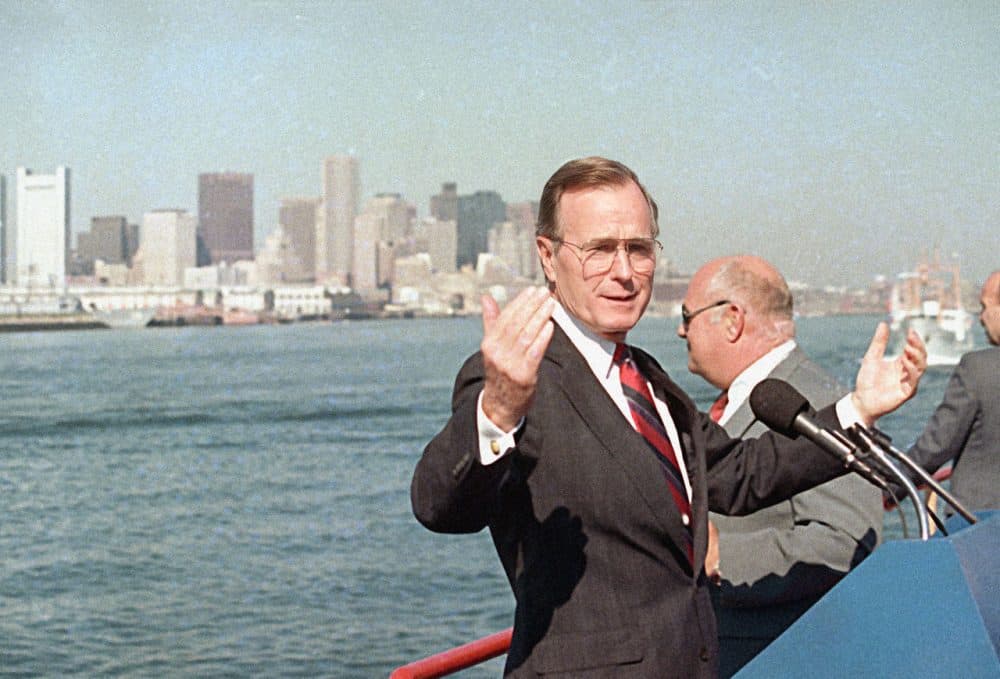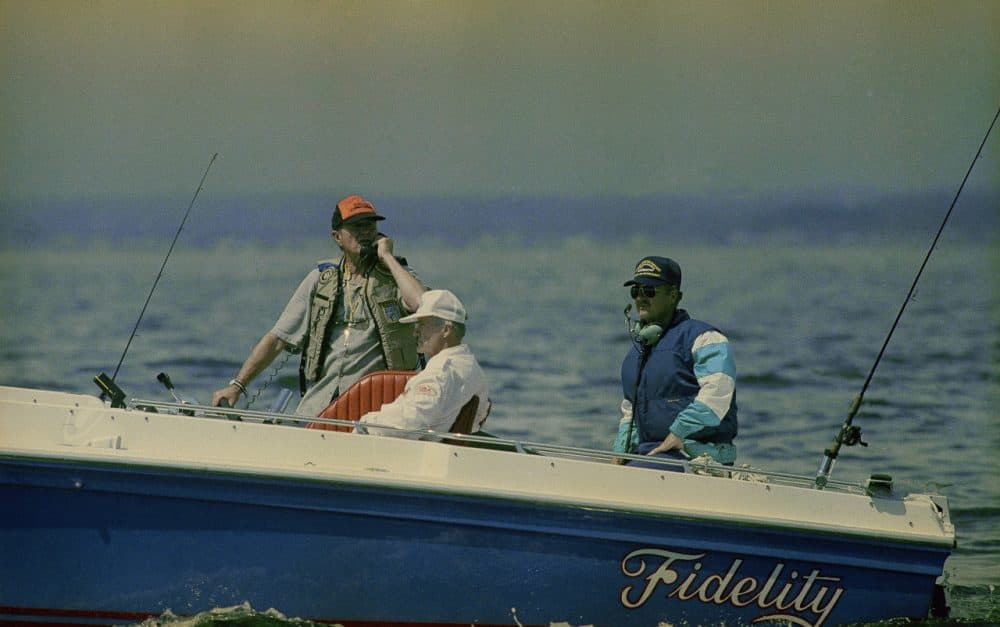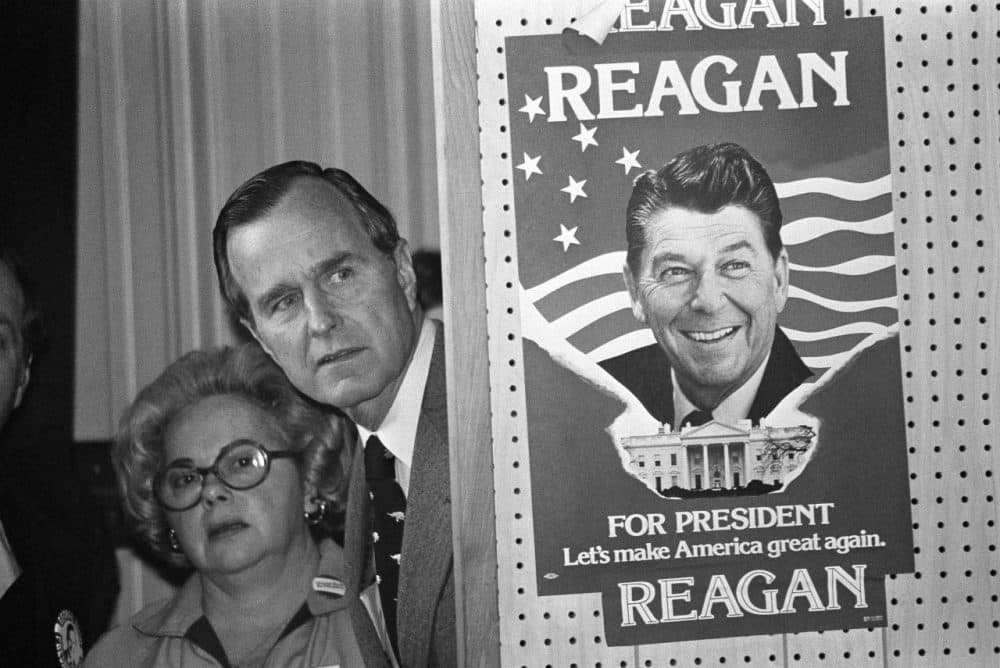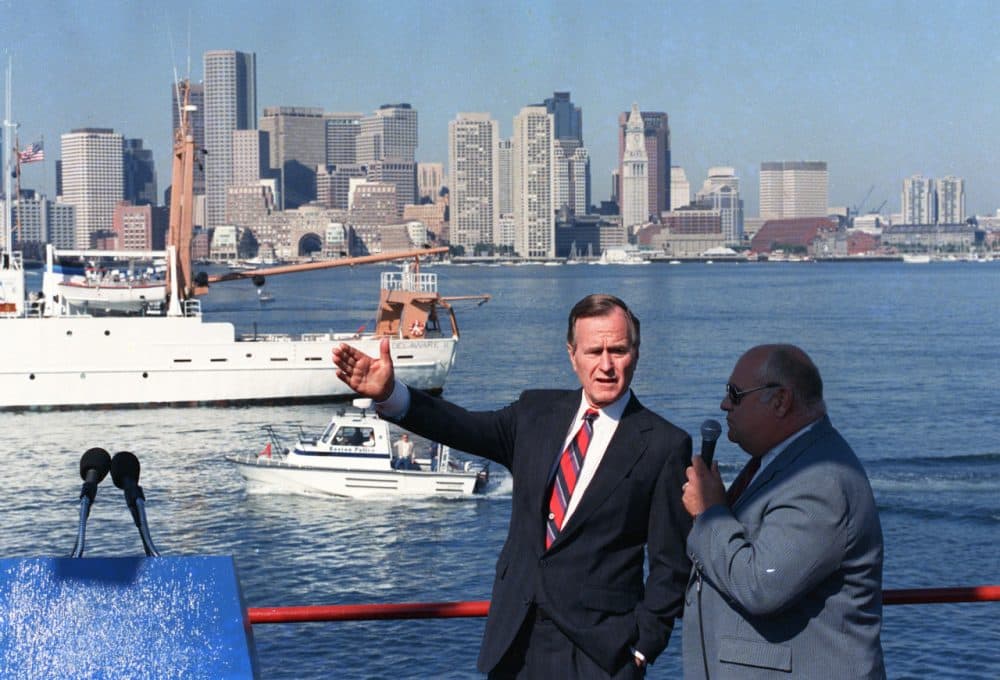Advertisement
George H.W. Bush Had Deep Roots In New England — And A Profound Impact On Boston Waters

Just how deep George Herbert Walker Bush's New England roots are could be illustrated by a moment in the 1980 presidential election.
Bush, who died Friday at the age of 94, was at a town hall somewhere in New Hampshire. Someone in the audience asked Bush what made him think he understood the needs of New Englanders.
It was as if someone had teed up the question for him.
After all, his family had a retreat in Kennebunkport, Maine, since the 19th century. He was born in Milton, Massachusetts, grew up in Greenwich, Connecticut, attended Philips Andover Academy and Yale University.

But New England was not kind to Bush that year. That town hall was one of the few high points of that New Hampshire primary for him. The primary is best remembered for a debate in which Bush's leading opponent, Ronald Reagan, grabbed the microphone.
"Is this on? Mr. Green..." Reagan asked, incorrectly naming the name of the Nashua Telegraph editor John Breen, the moderator of the debate.
"Could you turn that microphone off, please?" someone asked.
"I am paying for this microphone, Mr. Green," Reagan burst out.
Reagan had paid for a debate against Bush, and then insisted that the other candidates in the race be allowed to participate.
John Sununu, who would go on to become governor of New Hampshire and Bush's White House chief of staff, met Bush during that primary campaign.
"Certainly, that famous debate, where he told Mr. Green of the Nashua Telegraph that he had paid for the microphone was a very impressive, and I think probably, a very defining moment in that primary race," said Sununu in a telephone interview with WBUR.
Advertisement

When the campaign moved on to Massachusetts, a young state representative from Holliston was working for him. Andrew Natsios had received a call from Bush the year before.
"He wanted Bill Saltonstall, who was a [Massachusetts] state senator at the time, to run his campaign in Massachusetts. They had grown up together, because their fathers served in the U.S. Senate together," said Natsios recalled in a telephone interview with WBUR. "Prescott Bush, Bush's father, was a senator from Connecticut, while Bill Saltonstall's father, Leverett Saltonstall, was the senator from Massachusetts [and before that the state's 55th governor], and they were close friends. And so their sons grew up together. And Bill said: 'I'll be honorary chairman, but you need some younger legislators.'"
A Soft Spot For Nature And New England
Reagan's nomination as the GOP presidential candidate in 1980 solidified social conservatives' takeover of the national Republican Party. Bush had been seen as a moderate alternative to Reagan. But Sununu sees Bush as a solid conservative Republican, with one possible exception:
"He had a little bit of an environmental streak in him which might have made him more of a New England Republican," Sununu mused.
Sununu remembers how as president, Bush pushed through a cap-and-trade agreement that tackled what was then a big problem: acid rain.
"And certainly the 'Clean Air' bill that was passed had a huge impact on cleaning up New England air," Sununu said. "It really tightened up the standards in a way that allowed the most efficient technologies to be used to reduce sulfur dioxide and nitrous oxides, which are the contributors to New England acid rain."
He remembers how Bush worked with Sen. Edward Kennedy to pass the cap-and-trade bill.
"The president and Sen. Kennedy both wanted to have that piece of legislation, and the key to getting compromise that works for the country is leadership, and the fact that the president was willing to lead and Ted Kennedy was willing to lead on the Senate side I think made all the difference in the world," he recalled.

Bush also played a critical role in cleaning up Boston Harbor. It happened during his 1988 presidential campaign against Massachusetts Gov. Michael Dukakis. Peter Shelley was one of the attorneys who led the fight to clean up Boston Harbor. He was on the boat with Bush when he came to denounce how dirty it was.
"And his goal was to rub Governor Dukakis's face in the fact that the federal government was a plaintiff trying to clean up the harbor and the Commonwealth of Massachusetts was a defendant trying to delay that cleanup," he said.
Shelley says Bush's intervention played a key role.
"It had a huge impact," he said. "The fact that Vice President Bush was able to stick this label on the harbor as 'the dirtiest harbor in America' — which as far as I know has never been documented — it was a political line that stuck, was something that we used regularly to pressure the state, the Legislature to do something about this infamous category that the harbor had suddenly been thrust into."
In a way, Bostonians have George H. W. Bush to thank — at least in part — for the now-clean waters of Boston Harbor.
This segment aired on December 1, 2018.
